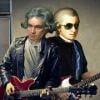
Ace drummer/composer Stewart Copeland has long established an identity of his own away from his first burst of international notoriety as part of the New Wave pop-rock trio The Police. Even while a member of the band in the early 1980s, he had branched out into film scores, and since then he has composed music for television, video games, and ringtones, along with concert music and operas. Most recently, his opera The Invention of Morel was performed by Long Beach Opera in 2018 and his latest one, Electric Saint, received its premiere in Weimar in September.
Yet the pull of his Police days — which yielded several top-10 hits before the band broke up at the height of its popularity — occasionally becomes too strong to resist. And so, with “The Police Deranged for Orchestra: The Music Of the Police,” the ever-flamboyant Copeland, now 69, returned to the songs that brung him to the dance, now all decorated with orchestral charts. He broke in the show at the new Rady Shell in San Diego Aug. 22; then it went to Cleveland in September and Buffalo last month before making a stop at The Soraya at Cal State University Northridge Thursday night (Nov. 4).

Copeland is not the first ex-Policeman to take the symphonic route; Sting preceded him by 11 years with his 2010 “Symphonicities” tour and album. Yet the Copeland and Sting enterprises differ in three ways. Sting’s playlist included only a handful of songs from the Police catalogue, concentrating on his solo material, while all but one of Copeland’s selections were Police tunes. While the Sting tour obviously featured the band’s authentic lead vocalist, Der Stingle himself, Copeland left the vocals to a trio of soul-styled female singers (Amy Keys, Carmel Helene, Ashley Tamar), whom Copeland calls the “Derange-ettes.” Also, Sting deployed a battalion of 10 arrangers, including top-flight chartmeisters like Michel Legrand and Vince Mendoza, whereas Copeland did all of his charts himself.

Copeland’s arrangements mostly did not stray far from what the band originally laid down on tape; they were hardly as “deranged” as the hype would have one expect. Sometimes he would retain the original semi-reggae feel in the rhythm, as in the opener “Demolition Man,” while abandoning it altogether in “Roxanne” (as did Sting) and “One World (Not Three),” giving the latter tune a different funky groove. He has said that he was mining the original session tapes for hidden guitar and bass lines to generate new ideas, and I wonder if they were the inspiration for the brass-and-saxes riff in “Roxanne” or the delicate flute lines in “Message in a Bottle.”
Copeland could employ some dissonance in the orchestra parts, conjure elaborate intros — like the brooding symphonic one to the band’s biggest hit, “Every Breath You Take” — but didn’t take things as far afield into the classical realm as Sting’s quote-minded arrangers did at his “Symphonicities” gig in Hollywood Bowl. The Re-Collective Orchestra — a Los Angeles ensemble composed of Black classical musicians who are usually busy resurrecting works by Black composers — coped gamely with the charts as led by Cheche Alara.
Watching Copeland hold what amounted to a drum clinic was a treat in itself, as he provided much of the firepower and groove behind the large ensemble. Unlike most rock-oriented drummers, he uses the underhand traditional grip in his left hand (the late Charlie Watts of the Rolling Stones was another who did), and he exploited his unusually wide dynamic range, playing softly and with precision and taste when the scoring called for it. He also did a bit of conducting, employing grandiose left-handed gestures to “The Equalizer Busy Equalizing” — his driving theme for the TV series The Equalizer — and strapped on an electric guitar to provide power chords for “The Bed’s Too Big Without You.” Randy Anderson and Armand Sabal-Lecco assumed the roles of Copeland’s former bandmates on electric guitar and bass respectively.

All that said, what really carried this concert and made it a pleasure for the ear, mind, heart, and feet were the Police’s songs themselves — mostly written by Sting. Whatever differences and conflicts that Copeland, Sting, and guitarist Andy Summers have had since their breakup (occasional brief reunions aside), Copeland recognizes that Sting’s songs were built to last — and he said as much at The Soraya, generously and with all due respect. That was good to hear.





